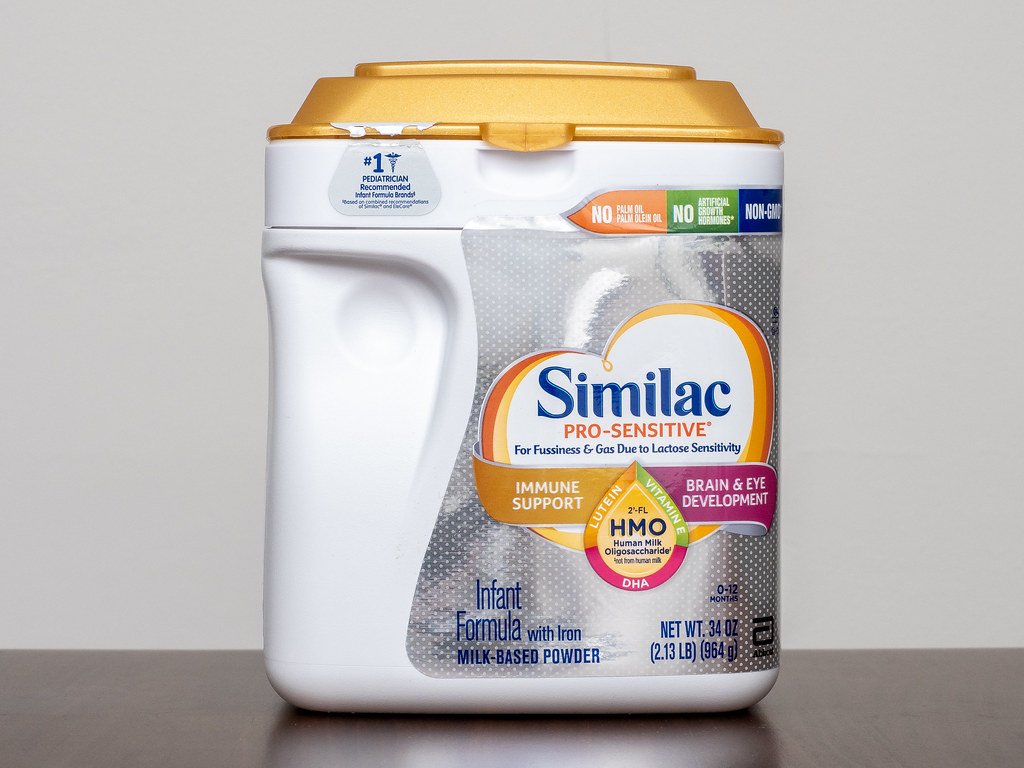Voyaging through the vast universe of infant nutrition, we explore the enchanting realm of baby formulas, where every ingredient tells a remarkable tale. As new parents eagerly seek the perfect concoction to nourish their little ones, the role of vitamins and minerals takes center stage. Behind the curtain of this nutritional symphony lies a world of scientific wonders, carefully crafted to satiate every growing need. In this ethereal landscape, we unravel the mysteries surrounding the vitamins and minerals that dance harmoniously within the elixir of baby formula, shedding light on their significance and the role they play in nurturing our precious bundles of joy.
Table of Contents
- Exploring the Essential Nutrients Present in Baby Formula
- Examining the Importance of Vitamins and Minerals in Infant Growth
- Understanding the Dosage and Recommended Intake of Nutrients in Baby Formula
- Choosing the Right Baby Formula with Optimal Vitamin and Mineral Content
- Navigating Potential Deficiencies and Supplementation in Baby Formula
- Q&A
- The Conclusion

Exploring the Essential Nutrients Present in Baby Formula
When it comes to providing the best nutrition for our little ones, baby formula plays a vital role. Packed with a combination of important nutrients, it aims to support their healthy growth and development. Let’s dive into the essential components that make up this important substitute for breast milk.
1. Proteins: Baby formula is enriched with high-quality proteins, such as whey or casein, to support muscle and tissue growth. These proteins are easily digested by infants, ensuring optimal nutrient absorption.
2. Carbohydrates: Essential for energy production, baby formula includes carbohydrates, often in the form of lactose or added sugars. These give your little one the fuel needed for their busy day of exploration and play.
3. Fats: Adequate fat intake is crucial for brain development in infants. Baby formula contains healthy fats like omega-3 and omega-6 fatty acids, promoting cognitive growth and improving visual acuity.
4. Vitamins and Minerals: Baby formula is fortified with a range of essential vitamins and minerals that are necessary for overall health. These include vitamins A, C, D, E, as well as minerals like iron, calcium, and zinc.
5. Prebiotics and Probiotics: Some baby formulas also contain prebiotics, which act as food for the good bacteria in the baby’s gut, promoting a healthy digestive system. Probiotics, on the other hand, introduce beneficial bacteria to support a strong immune system.
With these essential nutrients, baby formula aims to provide a balanced and nourishing alternative to breast milk. Each ingredient is carefully crafted to meet the unique needs of growing babies, helping them thrive during their early stages of life.

Examining the Importance of Vitamins and Minerals in Infant Growth
Vitamins and minerals play a crucial role in the growth and development of infants. It is during this early stage of life that their bodies require optimal nutrition to support the rapid physical and cognitive growth. Essential vitamins, such as vitamin A, C, D, E, and the B-vitamins, are vital for their overall health as they contribute to the development of a strong immune system, healthy skin, eyesight, and proper brain functioning.
These essential nutrients can be obtained through a variety of nutrient-rich foods. For example, fruits like oranges and strawberries are packed with vitamin C, while leafy greens like spinach and kale are excellent sources of vitamin A and D. In addition, fortified cereals and milk are great sources of B-vitamins, calcium, and vitamin E. It is important for parents and caregivers to provide a diverse and balanced diet to ensure infants receive all the necessary vitamins and minerals to support their growth.
Furthermore, minerals such as iron, calcium, and zinc also play a critical role in infant growth. Iron is essential for the production of hemoglobin and the development of strong muscles. Calcium is necessary for the formation of healthy bones and teeth, while zinc is involved in cell growth and the functioning of the immune system. Foods like meat, fish, beans, and dairy products are excellent sources of these minerals and can be included in an infant’s diet to support their overall growth and development.

Understanding the Dosage and Recommended Intake of Nutrients in Baby Formula
When it comes to providing your little one with the right nutrients, baby formula plays a crucial role. But understanding the dosage and recommended intake can sometimes be a bit overwhelming for parents. Fret not! We’re here to break it down for you.
1. The Basic Nutrients: Baby formula is designed to provide essential nutrients similar to breast milk. These nutrients include protein, carbohydrates, fats, vitamins, and minerals. Each of these components plays a vital role in supporting your baby’s growth and development. The exact proportions may vary depending on the specific formula, so always refer to the packaging and consult your pediatrician if needed.
2. Age-Appropriate Formulas: Different stages of your baby’s development require specific formulations. Most formulas are labeled according to the age range they cater to, such as newborn, infant, or toddler. It’s crucial to switch to the appropriate formula as your baby grows to ensure they receive the right balance of nutrients tailored to their needs.
3. Proper Dosage: Baby formula dosage typically depends on your baby’s weight and age. Most formulas provide general guidelines on the packaging to assist with proper serving sizes. However, it’s essential to consult your pediatrician for personalized advice based on your baby’s unique requirements.
Remember, every baby is different, and their nutritional needs may vary. Keeping an open line of communication with your pediatrician will help ensure your little one receives the optimal dosage and recommended intake of nutrients from their formula.

Choosing the Right Baby Formula with Optimal Vitamin and Mineral Content
When it comes to choosing the right baby formula, ensuring optimal vitamin and mineral content is of utmost importance for your little one’s development. Here are some factors to consider while selecting the best formula for your baby’s specific nutritional needs:
– Vitamin and Mineral Profile: Look for formulas that contain a comprehensive range of essential vitamins and minerals, including but not limited to vitamin D, iron, calcium, and zinc. These nutrients play a crucial role in supporting healthy bone development, immune function, and overall growth.
– Iron Fortification: Iron is vital for a baby’s brain development and overall cognitive function. Opt for a formula that is fortified with iron to ensure your baby is getting sufficient amounts of this important nutrient.
– Probiotics and Prebiotics: Consider formulas that contain beneficial probiotics and prebiotics. Probiotics are live bacteria that support a healthy gut microbiome, while prebiotics act as nourishment for these good bacteria. Together, they can help promote a strong immune system and aid in better digestion for your little one.
– Organic Options: If you prefer organic products, look for formulas that are certified organic. These formulas are made from ingredients that are produced without the use of harmful pesticides or genetically modified organisms (GMOs), providing a natural and clean option for your baby’s nutritional needs.
Remember, every baby is different, and it’s always a good idea to consult with your child’s pediatrician before making any changes to their diet. They can provide personalized recommendations based on your baby’s individual needs and help you choose the right formula with optimal vitamin and mineral content to support their healthy growth and development.
Navigating Potential Deficiencies and Supplementation in Baby Formula
Unlike breast milk, baby formula may sometimes lack certain nutrients or have potential deficiencies that need to be addressed for optimal infant nutrition. Fortunately, supplementation options are available to help navigate these potential shortcomings.
One common deficiency in baby formula is the lack of omega-3 fatty acids, essential for brain development and overall growth in babies. To address this, consider supplementing with fish oil or DHA-enriched formula. These sources of omega-3s can help support your baby’s cognitive and visual development.
Another important nutrient that may be lacking in baby formula is probiotics. Probiotics aid in digestion and support a healthy gut. To bridge this gap, pediatricians may recommend adding a probiotic powder or drops to your baby’s formula. This simple step can help promote good gut health and a stronger immune system.
Calcium, crucial for healthy bone development, is another nutrient that may require supplementation in some baby formulas. If your little one’s formula falls short in calcium content, consult with your pediatrician about adding a calcium supplement to ensure proper bone growth and development.
In summary, if you are using baby formula, it is important to be aware of potential deficiencies and take proactive steps to supplement as needed. Whether it’s omega-3s for brain development, probiotics for gut health, or calcium for strong bones, addressing these deficiencies can contribute to your baby’s overall growth and well-being. Always discuss with your pediatrician before adding any supplements to your baby’s feeding routine.
Q&A
What vitamins and minerals are essential for a baby’s development?
Babies require a range of vitamins and minerals to support healthy growth and development. Key nutrients include vitamin D for bone development, iron for healthy blood cells, and calcium for strong teeth and bones.
Why are vitamins and minerals added to baby formula?
Vitamins and minerals are added to baby formula to ensure that infants receive all the necessary nutrients for their growth and development. These nutrients can be found naturally in breast milk, but formula aims to mimic breast milk as closely as possible.
How are the vitamins and minerals in baby formula regulated?
The inclusion of vitamins and minerals in baby formula is carefully regulated by government agencies to ensure safety and efficacy. Formulas must comply with specific nutrient guidelines and undergo rigorous testing before being approved for market.
Are synthetic vitamins and minerals in formula as effective as those found in breast milk?
While synthetic vitamins and minerals in formula are designed to mimic those in breast milk, they may not be as bioavailable or easily absorbed by a baby’s body. However, these added nutrients are essential for babies who are not exclusively breastfed.
Can babies receive too much vitamins and minerals from formula?
It is unlikely that babies will receive excessive amounts of vitamins and minerals from formula if it is used as directed. However, it is important to follow the recommended guidelines for preparing and feeding formula to make sure babies receive optimal nutrition without exceeding safe levels.
What should parents consider when choosing a baby formula?
Parents should look for a formula that has a balanced blend of vitamins and minerals, following their pediatrician’s recommendations. Additionally, considering a formula with added probiotics and prebiotics can potentially support a baby’s immune and digestive systems.
Is it possible for a baby to develop vitamin or mineral deficiencies with formula feeding?
If a baby is consistently and properly fed with a commercially available formula, it is unlikely for them to develop vitamin or mineral deficiencies. However, it is essential to consult with a pediatrician to ensure the chosen formula meets the specific nutritional needs of the baby.
Can vitamins and minerals in formula support a baby’s overall health and immune system?
Yes, the inclusion of vitamins and minerals in baby formula supports a baby’s overall health and immune system. Nutrients like vitamin C and zinc help strengthen the immune system, while others, such as vitamin E and selenium, act as antioxidants and protect against cell damage.
The Conclusion
As we conclude this exploration into the fascinating world of vitamins and minerals in baby formula, it becomes abundantly clear that these tiny nutrients play an indispensable role in shaping the health and growth of our little ones. From the moment they are born, their bodies rely on a delicate balance of vital vitamins and minerals to thrive and develop their cognitive and physical abilities.
Through this journey, we have uncovered the incredible work behind the scenes in formulating baby formulas that mimic breast milk and provide a comprehensive range of essential nutrients. From vitamin A to zinc, iron to calcium, each component plays a vital role in fulfilling the nutritional needs of infants who are unable to experience the benefits of breastfeeding.
While the debate between breastfeeding and formula feeding continues, it is undeniable that advancements in the field of nutrition science have resulted in remarkable strides towards providing our little bundles of joy with all the necessary building blocks for a healthy start. Vitamins, with their potent ability to support growth and bolster the immune system, work hand in hand with minerals to ensure that no vital aspect of a baby’s development is left unsupported.
However, it is important to remember that baby formulas are intended as a supplement or substitute when breastfeeding is not possible. As parents, our ambition should always be to offer the best possible outcome for our children, which necessitates closely consulting healthcare professionals to make informed decisions tailored to each baby’s specific needs.
As we bid adieu to this enlightening discussion, let us embrace the invaluable role that vitamins and minerals play in baby formula, giving us peace of mind knowing that our little ones are receiving nourishment akin to nature’s own design. Let our journey into the world of nutrition serve as a reminder of the ceaseless dedication to crafting formulas that nurture our precious babies with the utmost care and attention to detail.
In our incessant pursuit of providing the best possible start in life for our children, let us cherish the wonders of modern science and the tireless efforts of researchers, nutritionists, and formula manufacturers who work tirelessly behind the scenes. May their dedication continue to shape the health and happiness of our little ones, paving the way for a bright future filled with boundless potential.
As an affiliate, my content may feature links to products I personally use and recommend. By taking action, like subscribing or making a purchase, you’ll be supporting my work and fueling my taco cravings at the same time. Win-win, right?
Want to read more? Check out our Affiliate Disclosure page.